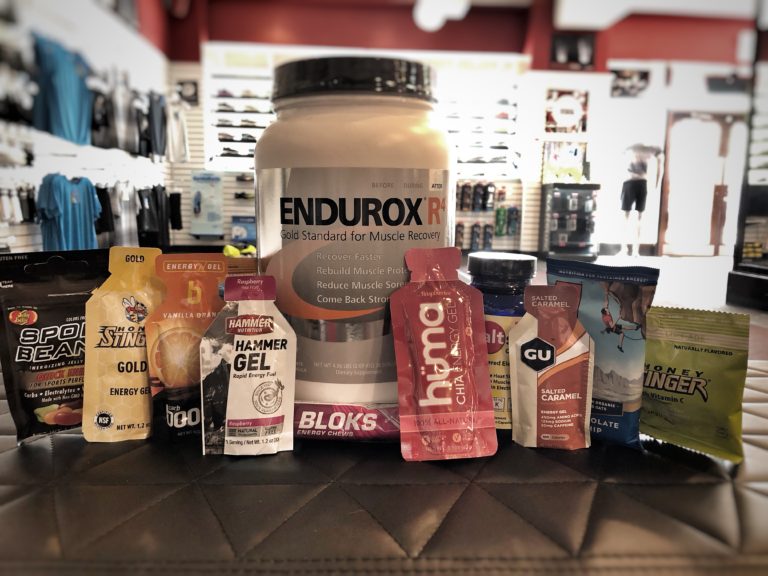I vividly remember the moment I started to appreciate the relationship between food and running. It was my freshman year of high school (Go Panthers!) when I discovered both distance running and gyros at the exact same time. I thought gyros were the perfect lunch–until I ate one on the same day as a track workout. Let’s just say that after that day my relationship with gyros changed forever. And my understanding of how to properly eat before a workout (and why) got a little better.
My next big revelation about nutrition and its impact on running came after college when I started running longer and longer distances (marathons and ultra marathons). Luckily, I had an experienced distance-running coach who explained the importance of in-race nutrition and its impact on performance. Even after 26 marathons and a half dozen or so ultra marathons in just over a decade, I am still playing with what works best for my body during long running events.
While I am not claiming to be a Sports Nutritionist, I do have a lot of experience when it comes to seeking out and finding the right fuel for my endurance events of choice. This is probably the topic that gets brought up the most when I talk with new half- and full-marathon runners.
If you are planning to run a race of ninety minutes or more and you are not thinking about a nutrition plan, you might want to start!
Below are some basic rules of thumb that I follow. Keep in mind that everyone is different and it is important to experiment and figure out what works best for you.
Nutrition Pre-Exercise or Pre-Race: (Source: Cassie Dimmick)
- Shorter weekday workouts: eat 30-60 min before
- Longer weekend workouts or competition: eat 2-3 hours before (Don’t worry about waking up that early before the long run unless you are simulating race day. Eat well the night before and snack 30-45 minutes before running.)
- Choose a meal or snack that is low in fat, contains complex carbohydrates, and has a little protein.
- Rule of Half: half a bagel, half a banana, half a cup of coffee, etc
- Eat familiar foods that you know you can tolerate
- Practice leading up to a long distance race
- Drink 10-16 oz of fluid 1-2 hours before exercise and another 4-8 oz right before you start.
Pre-Exercise food examples:
- Granola bar and a banana
- English muffin or bagel with peanut butter and a piece of fruit
- Smoothie
- Nutrition Bar
- Gel or Sports Chews
- Pretzels
Nutrition During Exercise or Race: (Source: Cassie Dimmick)
- Muscles use glycogen (the stored energy form of carbohydrates) and fat for fuel. Both fat and glycogen are used in most activities. Fat can be used as a fuel during aerobic exercise (long, low intensity exercise), but glycogen is the main fuel during strenuous exercise (running a half or full marathon) and anaerobic exercise (short bursts of all-out running).
- For exercise over 90 minutes, you need additional carbs from gels, bars, or other well-tolerated foods.
- For runs up to 120 minutes, 30 to 60 grams of carbs per hour of exercise is helpful.
- For runs over 120 minutes, aim for 60-90 grams per hour as tolerated.
Examples of approximately 30 Grams of carbohydrate:
- 1 banana
- 10 pretzels
- 2 Fig Newtons
- 1/4 bagel
- Gels and Sports Chews (Note: Gels and chews have roughly 22 to 29 grams of carbs per serving along with electrolytes. Take these with water to speed delivery of energy into your system.)
Nutrition Post Exercise or Race:
To become a better runner or walker you need to recover from running or walking. For proper recovery, it is recommended that you eat something with both carbohydrates and protein within 45 minutes to an hour after exercise. Failing to do so will most likely effect recovery time and limit the the improvements you can gain from your workout. Failing to recover not only can hinder potential benefits from exercise, but also can lead to injury over time. Read more about the science behind post-exercise recovery in this report by the American Council on Exercise.
I hope this article helps you answer some of your basic sports nutrition questions. At the very least, I hope it gets you thinking about the subject if you have not been already. If this is something you are really fascinated by and think it is the edge you need, I would recommend going to see a Sports Nutritionist to learn more. And remember, we are all different, so it’s important to experiment and find out what works best for your body.

